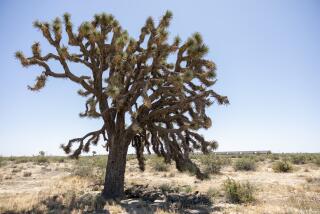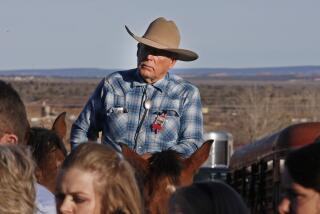Political Tug of War : Africa Bushmen’s Future Hanging in the Balance
- Share via
TSUMKWE, Namibia — The future is hanging in the balance for one of the last strongholds of the bushmen, an ancient people who once roamed through much of southern Africa.
The tiny bushmen, who are among the earliest known inhabitants of Africa, used to live by hunting and gathering roots. But they have been massacred and dispossessed by waves of conquering black tribes and white settlers. Farmland has encroached on their traditional hunting grounds.
Their livelihood disappeared as vast herds of game were wiped out and they clashed with white administrators, who punished them severely for hunting protected species.
Like the American Indians or the Australian aborigines, the bushmen became a people unable to find a place in the modern world.
Scattered Tribe
The remaining bushmen are scattered through southern Africa. One of the few places they have their own land is Bushmanland, an area of arid bush country on the fringes of the Kalahari desert in northeastern Namibia.
The government has made the area a tribal homeland, but as more bushmen have been brought here, there is not enough food to go around.
The future of the 3,600 bushmen has become a burning issue, with the Namibian government and army, conservationists and foreign charities all closely involved with their fate.
The bushmen in settlements around Tsumkwe, the tiny capital of Bushmanland, dress mostly in tattered, filthy Western clothes. They sit around their thatched huts, chattering in their language with its characteristic clicking sounds.
Skills Are Dying
Some still carry their traditional small bows and poisoned arrows, but old hunting and tracking skills are fast dying out.
The collapse of the old society has also brought social problems, with alcoholism and poor hygiene as major worries.
The future of the bushmen has become entangled in a controversy over turning eastern Bushmanland, the area with the best water for grazing cattle, into a game reserve where all farming would be prohibited.
Conservationists say a game park would preserve the bush region with its wide variety of animals and bring tourist money into the area. Critics say it would stop the bushmen from farming and turn them into curiosities for tourists.
Decision Is Near
After eight years of delays caused by frequent changes of administration and in-fighting between government departments, officials say the government is now close to a decision.
They say the final plan will be a compromise, which will encourage subsistence farming in most of the area while setting aside uninhabited areas for nature conservation.
The government is unlikely to proclaim a game reserve, but it plans to bar cattle from a strip of land near the border with Botswana. Officials say this is necessary to prevent the spread of cattle disease.
Johannes Swanepoel, the government’s chief control officer for bushmen, says the plan will cover all aspects of development in Bushmanland, including schools, health facilities and roads.
Devoted Time, Money
One man who has been a thorn in the government’s side is John Marshall, an American documentary film maker who has devoted much time and money to the bushmen’s plight.
Marshall wants to give the bushmen a chance to look after themselves by becoming subsistence farmers. He founded the Bushman Development Foundation, which provides them with cattle and tools and helps them set up small villages in the bush.
The British charity OXFAM has just given the foundation $40,000.
Marshall bitterly opposes a game reserve, saying it would leave the bushmen with no land and no way of making a living.
‘Act of Genocide’
“It would be an act of genocide by dispossession. It isn’t going around and putting people in gas ovens, but it’s slower, it’s quiet,” he told reporters.
Tsamko Toma, a local bushman leader, said all the bushmen should be consulted about what to do.
“A nature conservation area is wrong. We won’t be allowed to stay here with our cattle,” he said.
Toma and Marshall also were unhappy with the proposal to prohibit cattle from the border strip, saying this would deprive bushmen of half of their viable land.
Army Has Helped
While the government hesitated, the army has been responsible for developing most of Bushmanland.
Bushmanland lies just south of the operational area where South African-backed forces are battling guerrillas from the South West Africa People’s Organization (SWAPO) fighting for Namibian independence from South Africa.
Many bushmen have been recruited into the army and live on bases with their wives and families. Bushmen soldiers are well paid, and the standard of living of their families has shot up.
The army provides schools, roads and medical care and also encourages local people to farm and buy cattle. But critics like Marshall say the bushmen are growing too dependent on the army and question what will happen if the army leaves.
Integrated Approach
Marshall in turn has come under fire from the army and government officials for going his own way. The government wants an integrated approach to development and says it is impossible to provide schooling and health care for the far-flung settlements Marshall has helped set up.
Swanepoel says it is also misguided to give the bushmen cattle for nothing. The government is considering a plan where bushmen would be given cattle but would later have to give back a calf in return.
“The more we give to the bushmen the more they will sit back. It’s like a child. If you never leave them to fall they will never learn to walk,” Swanepoel said.
More to Read
Sign up for Essential California
The most important California stories and recommendations in your inbox every morning.
You may occasionally receive promotional content from the Los Angeles Times.













